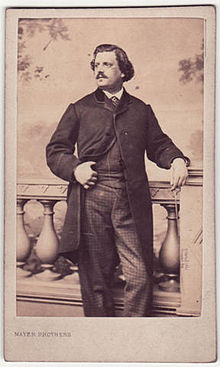Antonio Giuglini
| Antonio Giuglini | |
|---|---|
 |
|
| Born | 1825 Fano, Italy |
| Died | 12 October 1865 (aged 40) Pesaro |
| Education | in Italy with Francesco Cellini |
| Occupation | Opera singer |
Antonio Giuglini (16 or 17 January 1825 – 12 October 1865) was an Italian operatic tenor. During the last eight years of his life, before he developed signs of mental instability, he earned renown as one of the leading stars of the operatic scene in London. He created several major roles for British audiences, appearing in the first London performances of Gounod's Faust and Verdi's Un ballo in maschera. In London, he was the usual stage partner of the great dramatic soprano Thérèse Tietjens.
Guiglini was born at Fano in Italy's middle/north-east. He studied in his home country with Francesco Cellini, and made his debut in opera at Fermo.
According to the impresario Benjamin Lumley, Giuglini had been destined for the priesthood. He began in the choir of the metropolitan church of Fermo, where his excellence as a treble, and then as a tenor, attracted attention. He firmly resisted many inducements to appear on the stage, until one day he took the place of a member of the Theatre orchestra who fell ill. Soon afterwards the principal tenor also fell ill, and Giuglini took his place as Jacopo in I due Foscari. He was immediately successful, and then had brilliant successes at other theatres. This led him to Milan, where he came to the attention of the Emperor of Austria, who conferred on him the title of chamber-singer (Kammersänger) to his court, and wanted to engage him for Vienna. However Lumley had already booked him for three years in London, but the Viennese court then secured him in advance for the year 1860.
His first season at La Scala, Milan, in early 1855, was witnessed by Charles Santley who observed that he created 'a perfect furore' and was the hero of the day.
Santley saw him there as Raoul (Gli Ugonotti), in which he sang charmingly but lacked the fire and manliness for the role, as Arturo in I Puritani, which rivetted the attention completely, and in selection evenings, when he sang the trio 'Pappataci' from L'italiana in Algeri with Scheggi (buffo) and Ignazio Marini (bass), so popular it had to be repeated throughout the season. On 26 December 1855 he appeared at Teatro Regio di Parma in the first performance of Giovanna de Guzman, the first Italian version of Verdi's Les vêpres siciliennes.
...
Wikipedia
